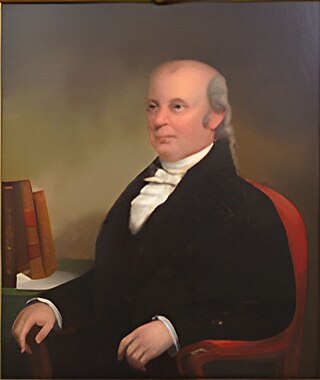The Anti-Masonic Party was the earliest third party in the United States. Formally a single-issue party, it strongly opposed Freemasonry in the United States. It was active from the late 1820s, especially in the Northeast, and later attempted to become a major party by expanding its platform to take positions on other issues. It declined quickly after 1832 as most members joined the new Whig Party; it disappeared after 1838.

Charles Francis Adams Sr. was an American historical editor, writer, politician, and diplomat. As United States Minister to the United Kingdom during the American Civil War, Adams was crucial to Union efforts to prevent British recognition of the Confederate States of America and maintain European neutrality to the utmost extent. Adams also featured in national and state politics before and after the Civil War.

Levi Lincoln Sr. was an American revolutionary, lawyer, and statesman from Massachusetts. A Democratic-Republican, he most notably served as Thomas Jefferson's first attorney general, and played a significant role in the events that led to the celebrated Marbury v. Madison court case. He served two terms as the lieutenant governor of Massachusetts, acting as governor for the remainder of Governor James Sullivan's term after his death in December 1808. Lincoln was unsuccessful in his bid to be elected governor in his own right in 1809.

Marcus Morton was an American lawyer, jurist, and politician from Taunton, Massachusetts. He served two terms as the governor of Massachusetts and several months as Acting Governor following the death in 1825 of William Eustis. He served for 15 years as an associate justice of the Massachusetts Supreme Judicial Court, all the while running unsuccessfully as a Democrat for governor. He finally won the 1839 election, acquiring exactly the number of votes required for a majority win over Edward Everett. After losing the 1840 and 1841 elections, he was elected in a narrow victory in 1842.

John Davis was an American lawyer, businessman and politician from Massachusetts. He spent 25 years in public service, serving in both houses of the United States Congress and for three non-consecutive years as Governor of Massachusetts. Because of his reputation for personal integrity he was known as "Honest John" Davis.

Levi Lincoln Jr. was an American lawyer and politician from Worcester, Massachusetts. He was the 13th governor of Massachusetts (1825–1834) and represented the state in the U.S. Congress (1834–1841). Lincoln's nine-year tenure as governor is the longest consecutive service in state history; only Michael Dukakis, John Hancock and Caleb Strong served more years, but they were not consecutive.

Charles Polk Jr. was an American farmer and politician from Big Stone Beach, in Milford Hundred, Kent County, Delaware. He was a member of the Federalist Party, and later the Whig Party, who served in the Delaware General Assembly and twice as governor of Delaware.
The Massachusetts Republican Party (MassGOP) is the Massachusetts branch of the U.S. Republican Party.

Enoch Lincoln was an American politician, serving as U.S. Representative from, successively, Massachusetts and from Maine. He was the son of Levi Lincoln Sr. and his wife, and the younger brother of Levi Lincoln Jr. Born in Worcester, Massachusetts, Lincoln graduated from Harvard College in 1807. He was elected and served as Governor of Maine from 1827 until his death in October 1829.

The 1978 Massachusetts gubernatorial election was held on November 7, 1978. Former Massachusetts Port Authority executive director Edward J. King was elected to a four-year term, from January 4, 1979, until January 6, 1983. King won the Democratic nomination by defeating incumbent governor of Massachusetts Michael Dukakis in the Democratic primary.
Elections to the Massachusetts Senate were held during 1788 to elect 40 State Senators. Candidates were elected at the county level, with some counties electing multiple Senators.
The 47th Massachusetts General Court, consisting of the Massachusetts Senate and the Massachusetts House of Representatives, met in 1826 and 1827 during the governorship of Levi Lincoln Jr. John Mills served as president of the Senate and William C. Jarvis served as speaker of the House.
Elections to the Massachusetts Senate were held during 1824 to elect State Senators. Candidates were elected at the county level, with some counties electing multiple Senators.

The 1830 Massachusetts gubernatorial election was held on April 5.

The second 1831 Massachusetts gubernatorial election was held on November 14.

The 1828 Massachusetts gubernatorial election was held on April 7.

The 1826 Massachusetts gubernatorial election was held on April 3.

The 1825 Massachusetts gubernatorial election was held on April 4.

The 1833–34 Massachusetts gubernatorial election consisted of a popular election held on November 11, 1833 and a legislative vote held in January 1834. The task of electing the governor fell to the Massachusetts General Court because no candidate received the constitutionally required majority of the popular vote.

The 1809 Massachusetts gubernatorial election was held on April 3, 1809.


















